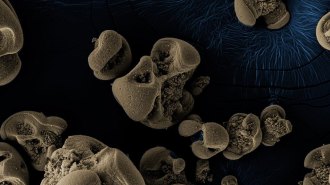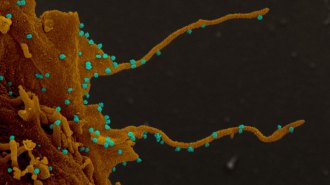News
-
 Archaeology
ArchaeologyStone artifacts hint that humans reached the Americas surprisingly early
Finds uncovered in a Mexican cave suggest North America may have had human inhabitants more than 30,000 years ago — way before archaeologists thought.
-
 Astronomy
AstronomyThis is the first picture of a sunlike star with multiple exoplanets
A first family portrait reveals a weird cousin of the solar system: a star about the mass of the sun orbited — distantly — by two massive gas giants.
-
 Health & Medicine
Health & MedicineA blood test may show which COVID-19 patients steroids will help — or harm
An inflammation marker was a good indicator of which patients had lower or higher risks of dying or needing a ventilator when given steroids.
-
 Health & Medicine
Health & MedicineCOVID-19 vaccines by Oxford, CanSino and Pfizer all trigger immune responses
In three clinical trials, vaccine candidates appear safe and induce the production of antibodies and other immune cell responses against the coronavirus.
-
 Microbes
MicrobesScientists stumbled across the first known manganese-fueled bacteria
A jar left soaking in an office sink helped scientists answer a century-old question of whether bacteria can use manganese for energy.
-
 Health & Medicine
Health & MedicineCoronavirus-infected cells sprout filaments that may spread the virus
Like other coronaviruses, the virus behind COVID-19 causes infected cells to grow spindly projections that may act as highways to other cells.
By Jack J. Lee -
 Astronomy
AstronomyPinning down the sun’s birthplace just got more complicated
Many astronomers think that the sun was born in a loose association of thousands of stars. A new study suggests there’s another possibility.
-
 Physics
PhysicsA giant underground motion sensor in Germany tracks Earth’s wobbles
A giant underground gyroscope array has taken its first measurements of how the world goes ’round.
-
 Earth
EarthAn asteroid impact, not volcanism, may have made Earth unlivable for dinosaurs
New simulations add to growing evidence that an asteroid strike, rather than the Deccan Traps eruptions, caused the end-Cretaceous extinction.
By Megan Sever -
 Science & Society
Science & SocietyCollege biology textbooks still portray a world of white scientists
Despite recent efforts to include more women and people of color, it will be decades — or even centuries — before textbooks reflect student diversity.
-
 Paleontology
PaleontologyThis dinosaur may have shed its feathers like modern songbirds
One of the earliest flying dinosaurs, the four-winged Microraptor, may have molted just a bit at a time so that it could fly year-round.
-
 Astronomy
AstronomyThe closest images of the sun ever taken reveal ‘campfire’ flares
The first images from Solar Orbiter, a NASA-European Space Agency spacecraft, show tiny, never-before-seen flares across the sun’s surface.